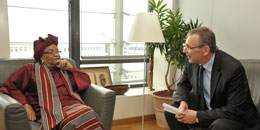New EU support to save lives of mothers in Liberia

EU Commissioner for Development Andris Piebalgs announced this week a new €42 million programme during a meeting with Ellen Johnson Sirleaf, president of Liberia and the 2011 Nobel Peace Prize winner.
The new EU funding will contribute to halving maternal mortality rate to 375 per 100,000 live births from the current level of 770 per 100,000 (one of the highest in the world). These funds will be used for rehabilitating health centres, providing medical equipment, training health staff and many other activities aimed at improving health services in the country. This EU funding is part of the EU's €1 billion MDG initiative to foster global progress on the Millennium Development Goals before 2015. During the meeting the President and the Commissioner also discussed the EU's development work and political dialogue with Liberia as well as regional cooperation in West Africa more widely and progress towards meeting the Millennium Development Goals.
Commissioner Piebalgs said: "I am delighted to have met President Sirleaf, who has made great efforts to stabilise Liberia and promote women's rights and whose actions have inspired hope in the country and beyond. I encouraged the President to pursue her efforts towards national reconciliation and the fight against corruption. I stand firmly with her and her government on its agenda for state building and reconstruction. I also confirmed to President Sirleaf that we will support her reform efforts in the forestry sector and in the fight against illegal timber exports from Liberia."
He added: "I am also glad to announce that the European Commission will shortly adopt a new programme that will help the government to save the lives of thousands of mothers who would otherwise die around the time of childbirth."
About four women die every day from child birth or pregnancy related conditions. Only 37% of deliveries take place in health facilities and only 46% of births are attended by people who have received training.
To read more: http://europa.eu/rapid/press-release_IP-12-1186_en.htm















